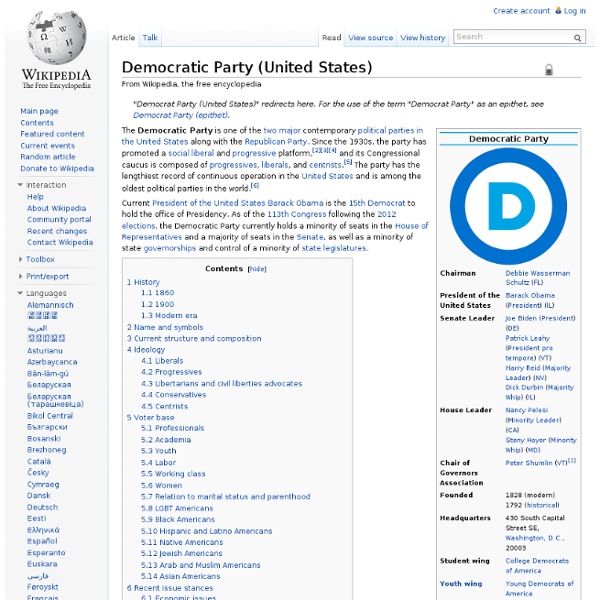Libertarian Party (United States)
Tonie Nathan, running as the Libertarian Party's vice-presidential candidate in the 1972 Presidential Election with John Hospers as the presidential candidate, was the first female candidate in the United States to win an electoral vote.[9][23] The 2012 election Libertarian Party presidential candidate, former New Mexico governor Gary Johnson, was chosen on May 4, 2012 at the 2012 Libertarian National Convention in Summerlin, Nevada.[26] "There Ain't No Such Thing As A Free Lunch" In 1972, "Libertarian Party" was chosen as the party's name, selected over "New Liberty Party. Also in 1972, the "Libersign"—an arrow angling upward through the abbreviation "TANSTAAFL"—was adopted as a party symbol.[27] Sometime after, this was replaced with the Lady Liberty, which has, ever since, served as the party's symbol or mascot.[29][30] The porcupine is also a mascot of the Libertarian Party. The Libertarian National Committee (LNC)[33] is a 27-member body, currently chaired by Geoff Neale.
FedStats
Republican Party (United States)
History Founding and 19th century The first official party convention was held on July 6, 1854, in Jackson, Michigan. By 1858, the Republicans dominated nearly all Northern states. The Republicans' initial base was in the Northeast and the upper Midwest. Early Republican ideology was reflected in the 1856 slogan "free labor, free land, free men", which had been coined by Salmon P. The GOP supported business generally, hard money (i.e., the gold standard), high tariffs to promote economic growth, high wages and high profits, generous pensions for Union veterans, and (after 1893) the annexation of Hawaii. Nevertheless, by 1890 the Republicans had agreed to the Sherman Antitrust Act and the Interstate Commerce Commission in response to complaints from owners of small businesses and farmers. After the two terms of Democrat Grover Cleveland, the election of William McKinley in 1896 is widely seen as a resurgence of Republican dominance and is sometimes cited as a realigning election.
Occupational Outlook Handbook, 2010-11 Edition
Funeral Directors Funeral directors, also called morticians and undertakers, manage funeral homes and arrange the details of a funeral. view profile » Insurance Underwriters Insurance underwriters decide whether to provide insurance and under what terms. Computer and Information Research Scientists Computer and information research scientists invent and design new technology and find new uses for existing technology. Mathematicians Mathematicians use high-level mathematics and technology to develop new mathematical principles, understand relationships between existing principles, and solve real-world problems. Atmospheric Scientists, Including Meteorologists Atmospheric scientists study weather, climate, and other aspects of the atmosphere. Economists Economists study the production and distribution of resources, goods, and services. Health Educators Health educators teach people about behaviors that promote wellness. Court Reporters Dietitians and Nutritionists Audiologists Travel Agents Legislators
Scouting
Leaders welcome a boy into Scouting, March 2010, Mexico City, Mexico. The two largest umbrella organizations are the World Organization of the Scout Movement (WOSM), for boys-only and co-educational organizations, and the World Association of Girl Guides and Girl Scouts (WAGGGS), primarily for girls-only organizations but also accepting co-educational organizations. The year 2007 marked the centenary of Scouting world wide, and member organizations planned events to celebrate the occasion. History[edit] Origins[edit] Three years later, in South Africa during the Second Boer War, Baden-Powell was besieged in the small town of Mafeking by a much larger Boer army (the Siege of Mafeking).[11] The Mafeking Cadet Corps was a group of youths that supported the troops by carrying messages, which freed the men for military duties and kept the boys occupied during the long siege. Growth[edit] Influences[edit]
AAHA | AAHA Guidelines
OTHER SITES: Career Center | DEVTP | JAAHA | NEWStat | Microchip Lookup | My Veterinary Career | Pet Owners | Students | Yearly Conference Search: More search options Login: Remember me? Login Help | Create Account Guidelines & Toolkits <div style="background-color:Red; text-align:center; color:White; width:100%; height:40px; font-size:13px; padding-top:10px;"><strong><span style=" font-size:15px;">JAVA SCRIPT IS DISABLED! AAHAnet | Library | Guidelines & Toolkits | AAHA Guidelines AAHA Guidelines Guidelines are developed by a team of experts to provide recommendations that improve the quality of pet care or provide guidance on other veterinary-related issues. Parasite Counselor This free, one-hour, online course is designed for all veterinary staff. American Animal Hospital Association | Copyright © 2014 | Privacy Statement AAHA Career Opportunities | Contact Us | Advertising and Sponsorship | Going Green Media | Author Submissions | Speakers | Reviewers Click to view all AAHA Sponsors
Youth Resources and Information
Merck Veterinary Manual
FINANCIAL TYRANNY: Defeating the Greatest Cover-Up of All Time
FINAL VERSION 2/9! A 122-nation alliance is backing a lawsuit that could free the Earth from financial tyranny. This investigation reveals who the perpetrators are and what we can do to solve the problem. Please Note: You may quote excerpts from this investigation and republish them in your blog, but please do not re-post the entire investigation, as additional updates and ‘tweaks’ may be necessary. 2012 has begun as a year of rampant paranoia and hopelessness on the Internet and throughout mainstream media. The economy appears to be in a dire predicament — ready to go over a cliff into an abyss few can even allow themselves to consider. Since 9/11, Americans and much of the Western world have been led to believe that the biggest enemy they face is terrorism from Islamic extremists. You are about to read a comprehensive investigation summarizing all the best information I have gathered about the true nature of this crisis since I became directly aware of it, twenty years ago — in 1992. J.
Veterinary Medicine – Dog and Cat Diseases, Vet Schools, Parvo, Vet Questions



